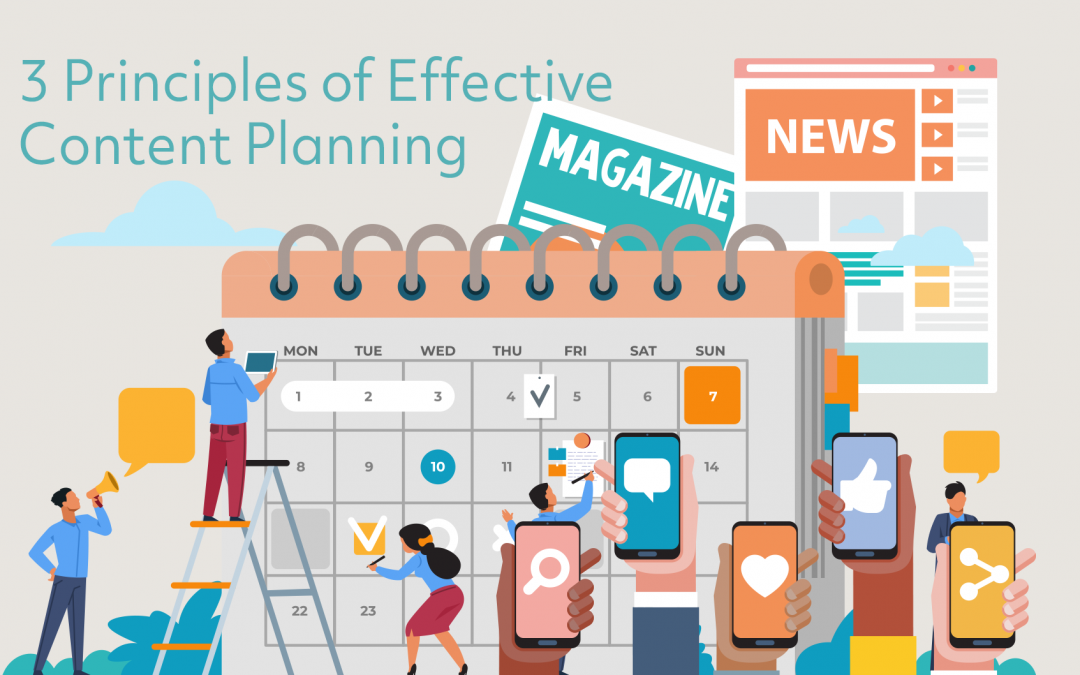For those of us in the PR industry, effective content planning is a no brainer. But what does it actually mean and why is it important? Put simply, content planning is what you’re going to post or publish, when, and where you’ll do it. A content plan plays a crucial role in shaping a company’s brand image, building relationships with customers, and driving business growth. A successful content plan will attract your target audience and keep them engaged up to and past the point of purchase. Done well, your content plan will engage your audience no matter what stage of the sales funnel they’re at.
To effectively engage your audience and achieve your business goals, your content plan needs to be designed to enable you to communicate to your audience that you truly understand their needs and pain points. It also needs to be industry relevant, and of course consistent in terms of messaging.

1. Address your audience’s pain points
One of the most important principles for successful content planning is focusing on your audience’s pain points rather than solely promoting your product, service, or solution. People don’t care about your company or your products. They care about their own company and products, and their own problems. By shifting the focus to their needs and challenges, your content will be more useful and valuable to them. This approach establishes a genuine dialogue with potential customers, creating trust, and positioning your brand as a helpful resource. People don’t want to know what you’re selling, they want to know what’s in it for them.
Far too many companies use content as an opportunity to self-promote. It’s all: look at us, look how good we are, look how many products we’ve sold, etc. You get the drift! Content is not the place for a sales pitch. If that’s what the reader gets, then they probably won’t make it past the first few lines. If you’re writing about an exciting new industry trend, then don’t just write about what your product or company does, even if it is following the trend. Write about what the trend means for the industry. What challenges and opportunities does it bring?

2. Tie content into industry conversations
Effective content planning can’t exist in a silo; it requires thoughtful consideration of the broader industry landscape. While it’s crucial to plan ahead, it’s equally important to leave some scope to respond to new developments as they arise. By monitoring industry trends, news, and social media conversations, you can position your brand at the forefront of discussions. The key here is to think about your company values and find an angle to make the conversation relevant to you, all without turning it in to a sales pitch or being tokenistic. It’s essential to go beyond superficial engagement and make sure your contributions add value and authenticity to the conversation.
Take International Women’s Day. If you’re genuinely trying to do your bit to help achieve parity for women, and the equality movement means a lot to you, then join the conversation on socials and shout about it. But if, on the other hand, you’re doing nothing to help advance equality for women, and the movement is not close to your heart, then don’t bother joining in. Everyone can see through the company that posts a picture of their only female employee and congratulates themselves for doing their bit. Don’t jump on the bandwagon.

3. Consistent messaging across all content formats
It’s vital to maintain consistent messaging throughout all your content, whatever the format. Creating a strong thread that connects different content pieces, from social media posts through to thought leadership articles, will enable you to reinforce your brand’s core message and values. Consistency in messaging helps build brand recognition, establish credibility, and reinforce key points in your audience’s minds. By presenting your message in different formats, you can cater to different audience preferences and maximise the reach and impact of your content.
Avoid those one hit wonders where you write about something completely off-piste just because it seemed like a good idea at the time. While your content needs some personality and variety, it still needs to follow a clearly defined strategy. For example, don’t go rogue and post about sustainability when you haven’t thought about it before, and know nothing about it. It’s no good describing something as sustainable without the evidence backing the claim up. And it’s just as unhelpful to highlight environmental concerns in an insensitive way. A better approach would be to define early on your tone of voice around sustainability and make sure everyone in the company knows what it is. This is crucial for authenticity.
By ensuring your content centres around what is useful and valuable to your audience, while tying in with industry conversations, and being consistent in its messaging, you can create a plan that will result in compelling content that resonates with your audience, strengthens your brand, and drives tangible results.
As PR and marketing specialists for the broadcast and satellite industries, we instinctively know what kind of content plan works best to achieve specific aims and objectives. Whether you’re an established company or a start-up, we can work with you to produce a great content plan. We can also put your content plan into action by creating engaging and compelling content for you, leaving you free to focus on other things. Sound good? Thought so.
Get in touch now to learn more about how we can help you to engage better with your target audience so that you can grow your business.

